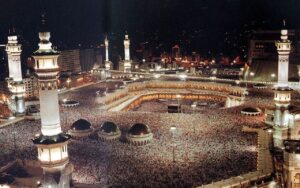The heart of Islam is devotion

Islam is a religion of obedience, moderation and submission to the will of Allah (God). The followers of Islam, known as Muslims, believe that Islam, insofar as devotion (“Islam”) to God (Allah) is at the heart of the religion, is the result of the manifestation of mankind’s true religion throughout its history. What God inspired in Adam, Abraham, Moses and Jesus, He realised in His revelations through Muhammad [Muhammad Ibn Abdullah] (570-632). Muhammad is therefore the “seal” of the prophets whom God used to reveal His divine nature and will in history.
Islam has its own particular cult, linked to certain ritual traditions. The ordinary Muslim lives according to the rules of behaviour and traditions developed over centuries.
Islam is the world’s fastest growing religion
Today, Islam is the world’s fastest growing religion. By some estimates, there are up to one billion Muslims in the world. Islam is the second largest religion in the world (in terms of the number of people practising it) and has followers on every continent. In addition to its traditional range in the Middle East, Islam is today particularly strong in Africa, Pakistan, Afghanistan, Central Asia, Indonesia and Malaysia. Everywhere, Islam has traditionally combined religion and culture, with little distinction between the secular and the sacred. Today, fundamentalism is a strong force, but Muslims are traditionally sophisticated exegetes and lawyers. Fundamentalist or sophisticated, every practising Muslim believes strongly in prayer.
While secular historians tend to think that Muhammad adapted ideas that had reached Arabia through Judaism and Christians, devout Muslims believe that Islam was a new creation: a religion designed specifically for Arabs, and a full expression of the devotion to God that is necessary for a right relationship with him.
The essence of the Islamic faith
The essence of the Islamic faith lies in the creed: there is no deity other than Allah, and Muhammad is Allah’s messenger. Muslims are strict monotheists, convinced that Allah alone rules over creation. The Muslim concept of monotheism denies the Christian Trinity and the Incarnation. However, Judaism and Christianity are recognised as sister faiths because they derive from earlier, imperfect revelations handed down by a number of prophets, including the last prophet, Muhammad.
The Qur’an (‘The Reading’) is the holy book of Islam, dictated to Muhammad by the archangel Gabriel. It is the prophecies handed down to Muhammad – it has existed through the ages and is literally the Word of God. The content of the Qur’an was transmitted orally. After Muhammad’s death it was written down. It is written in Arabic. It consists of 114 chapters called surahs1.
The Koran is the most important book
The Koran is the most important book, but the Bible also has its value. Messengers of Allah, such as Abraham and Jesus, are the forerunners of Muhammad. Muslims recognise Allah’s sole sovereignty. Allah is the Lord of the world, the absolute controller of nature, history and destiny. Islam certainly affirms man’s sovereignty and therefore responsibility for his actions, but it always speaks of Allah’s authority and consistently extols his control. Only when Allah wills it does a certain sequence of actions come to fruition. Only when Allah wills does anything flourish or decay.
Islam has put the foundations of its practice into five arcana (pillars):
The five arcana
The five arcana describe how Muslims express their faith in action.
1. Shahada. This is a declaration of faith that needs to be repeated several times a day: ‘There is no God but Allah, and Muhammad is His prophet’.
2. Salat. These are the five prayers to be recited in Arabic every day at dawn, just after midday, in the afternoon, just after sunset and at dusk. The prayers can be said in any clean place. In addition, additional prayers may be offered at any time. The prayer consists mainly of verses from the Qur’an praising Allah and asking Him to guide people.
Traditionally, Muslims pray facing Mecca. They kneel, bow and touch the floor with their heads. Once inside the mosque, they move in unison: standing, kneeling and bowing together. Usually men and women are separated. The conditions for women to enter mosques and read the Koran have evolved over the centuries, but women, like men, were required to pray.
3. Zakiat. This is the annual donation of money to the poor by every wealthy Muslim, 2.5% of savings, etc. Values.
4. Saum. This is fasting. In the ninth Muslim month of Ramadan, from dawn to dusk, no one eats or drinks anything. Fasting reminds them to enjoy good things, not abuse them. It is also an attempt to show that everyone is equally poor. Ramadan is a month to study the Koran, to discipline oneself and to practice good deeds.
5. Hajj. Pilgrimage. Muslims hope to travel to Mecca at least once in their lifetime and visit the Kaaba, the black stone that was believed to be white but turned black by human stains. The Hajj is usually the 12th Muslim month. Only those who can guarantee that their family will be provided for in their absence are allowed to go to the Hajj. The poor, the old and the disabled do not have to go.
Lietuvosvalstybe.com

